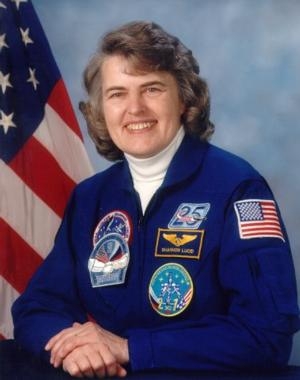Wed, Feb 01, 2012
Veteran Of Five Spaceflights Logged 223 Days In Space
Shannon Lucid, a member of NASA's first astronaut class to
include women, has retired after more than three decades of service
to the agency. A veteran of five spaceflights, Lucid logged more
than 223 days in space, and from August 1991 to June 2007, held the
record for the most days in orbit by any woman in the world. Lucid
is the only American woman to serve aboard the Russian Mir space
station. She lived and worked there for more than 188 days, the
longest stay of any American on that vehicle. Her time on Mir also
set the single flight endurance record by a woman until Suni
Williams broke it in 2006.
Shannon Lucid

"Shannon is an extraordinary woman and scientist. She paved the
way for so many of us," said Peggy Whitson, chief of NASA's
Astronaut Office at the Johnson Space Center in Houston. "She was a
model astronaut for long-duration missions, and whether she was
flying hundreds of miles up in space or serving as Capcom [capsule
communicator] during the overnight hours for our space shuttle and
space station crews, she always brought a smile to our faces. Like
so many others, I always will look up to her."
Lucid, who holds a doctorate in biochemistry, was selected by
NASA in 1978. She joined five other women as the agency's first
female astronauts. Her first three shuttle missions deployed
satellites. STS-51G in 1985 deployed and retrieved the SPARTAN
satellite; STS-34 in 1989 deployed the Galileo spacecraft to
explore Jupiter; and STS-43 in 1991 deployed the fifth Tracking and
Data Relay Satellite (TDRS-E). Her fourth shuttle mission, STS-58
in 1993, focused on medical experiments and engineering tests.
Lucid traveled aboard Atlantis on STS-76 in March 1996 to the
Russian Mir space station. She performed numerous life science and
physical science experiments during the course of her stay. She
returned from the station aboard Atlantis on STS-79 in September
1996.
In 2002, Lucid served as NASA's chief scientist at the agency's
headquarters in Washington. She returned to Johnson in the fall
of
2003 and resumed technical assignments in the Astronaut Office. She
served as a Capcom in the Mission Control Center for numerous space
shuttle and space station crews, representing the flight crew
office and providing a friendly voice for dozens of friends and
colleagues in space.
More News
“While legendary World War II aircraft such as the Corsair and P-51 Mustang still were widely flown at the start of the Korean War in 1950, a new age of jets rapidly came to >[...]
Decision Altitude (DA) A specified altitude (mean sea level (MSL)) on an instrument approach procedure (ILS, GLS, vertically guided RNAV) at which the pilot must decide whether to >[...]
Aero Linx: National Aviation Safety Foundation (NASF) The National Aviation Safety Foundation is a support group whose objective is to enhance aviation safety through educational p>[...]
Also: Cal Poly Aviation Club, $$un Country, Arkansas Aviation Academy, Teamsters Local 2118 In response to two recent general aviation accidents that made national headlines, more >[...]
“The FAA is tasked with ensuring our skies are safe, and they do a great job at it, but there is something about the system that is holding up the medical process. Obviously,>[...]
 Aero-News: Quote of the Day (04.28.25)
Aero-News: Quote of the Day (04.28.25) ANN's Daily Aero-Term (04.28.25): Decision Altitude (DA)
ANN's Daily Aero-Term (04.28.25): Decision Altitude (DA) ANN's Daily Aero-Linx (04.28.25)
ANN's Daily Aero-Linx (04.28.25) Airborne-Flight Training 04.24.25: GA Refocused, Seminole/Epic, WestJet v TFWP
Airborne-Flight Training 04.24.25: GA Refocused, Seminole/Epic, WestJet v TFWP Aero-News: Quote of the Day (04.29.25)
Aero-News: Quote of the Day (04.29.25)



